Our fellows
Our fellows
Our Fellows are at the heart of what we do...
.....and it is in our Vision and Mission that Griffins:
- harness the experience and knowledge of practitioners working on the front-line;
- enable them to identify, explore and draw attention to specific issues relating to women and girls in contact with criminal justice;
- provide them with the opportunity and the capacity to undertake robust and rigorous research whilst remaining in the workplace;
- that through the use of qualitative research techniques, ensure the reality of the lived experience of women and girls is captured and heard;
- supports individual growth by encouraging new ways of thinking and developing new skills, broadening experience and understanding and increasing self-confidence;
- links them with fellow practitioners, academics and policy makers, providing the opportunity to influence and promote change, locally and nationally.
Now meet some of our current and past fellows......
They are displayed by the year they joined Griffins, with our most recent fellows at the top.
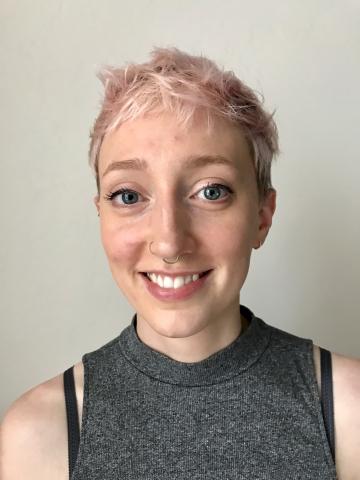
Bécky Fedia
Date joined:
I am currently a senior manager at Women in Prison, managing and developing community services for women affected by the criminal justice system, including women’s centres, hubs services and pan-London outreach services. I am also a Trauma Centre Trauma Sensitive Yoga facilitator.
My area of interest lies in the delivery of trauma-responsive and gender-specific services for women who have survived inter-relational abuse and my research has arisen from the observation of a gap in consistent community delivery for women that understands the role of trauma in women’s recovery from involvement in the criminal justice system and responds in a unified way. This is particularly important given the close working between voluntary sector and statutory organisations who often adopt different models of working. Numerous models of trauma-informed practice have arisen within prisons and I hope to ascertain what, if anything might be adapted for community work with women, particularly in the context of the delivery of probation services. In recognition of the high level of complex trauma experienced by women accessing probation and community criminal justice services, I hope that this research might promote an understanding of the need for a consistent response across the sector to women’s past and current experiences of complex trauma and increased consideration of how this intersects with offending and needs to be considered in the context of recovery.
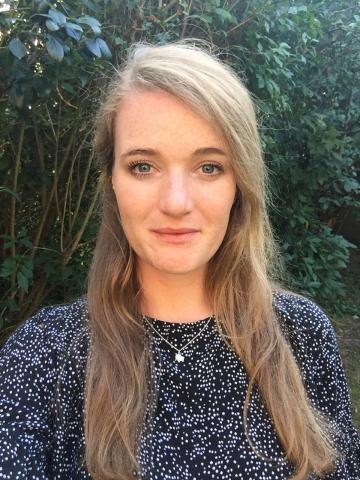
Eleanor Ward
Date joined:
I am a Dedicated Ward Officer for Tottenham Hale ward in the Metropolitan Police. My role involves working closely with schools and youth groups in Tottenham, which is located in Haringey, the 6th most deprived borough in London. I am passionate about building better relations between young people and the police. Before I joined the Met, I worked as a journalist, primarily reporting on social justice through the lens of social enterprise, social impact investment and corporate social responsibility in the UK and internationally. I also edited the Tottenham Community Press, a community newspaper, and helped develop it into a sustainable social enterprise through its pilot year. I have a BA in Journalism from City University and an MA from the University of East Anglia in Globalisation, Business and Sustainable Development.
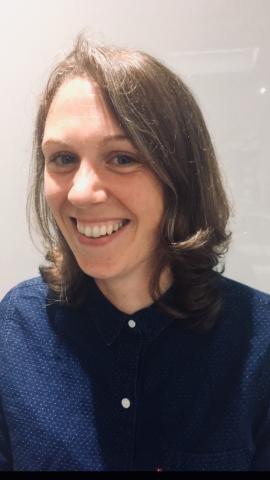
Rachel Reed
Date joined:
I currently work in the North West Division of the National Probation Service as the Women’s Strategy Lead. This is a new role introduced as part of the Female Offender Strategy (MOJ, 2018) with a remit to improve sentencer confidence in community options and reduce the number of women sentenced to short-term custody. Before moving to this role, I worked in a specialist Probation team responsible for delivering the Offender Personality Disorder Strategy, a joint initiative between HMPPS and the NHS, providing a psychological consultation and formulation service to Probation Officers. I also spent three years working as a group facilitator in a Day Democratic Therapeutic Community, a role which had a particular impact in terms of challenging my thinking and encouraging an emphasis on service user voice as a first priority in both defining problems and seeking solutions. I also have a keen interest in trauma-informed practice, in particular how this translates within the Criminal Justice System. I hold a BA (Hons) undergraduate degree in English Language and Literature and an MSc in Psychology.
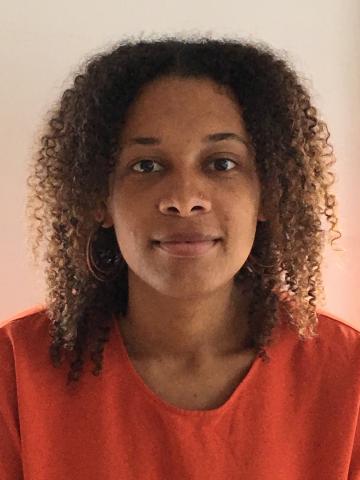
Naima Sakande
Date joined:
I manage the Women's Justice Initiative at the Centre for Criminal Appeals, where we use impact litigation to challenge systemic injustices faced by women experiencing severe and multiple disadvantage. Before joining the Centre in December 2017, I managed programmes for young women affected by gangs in London at the youth charity, Leap Confronting Conflict. I also spent a year working on pre-trial criminal cases as an investigator for the Bronx Defenders, a pro-bono public defence law firm in New York City. I am a trustee of the charity Women in Prison who campaign for radical alternatives to prison for women in the justice system and I am also the creator and host of the podcast, Third Culture, which explores the heritage and stories of people with mixed identities. I have a B.A. in International Development from Yale University.
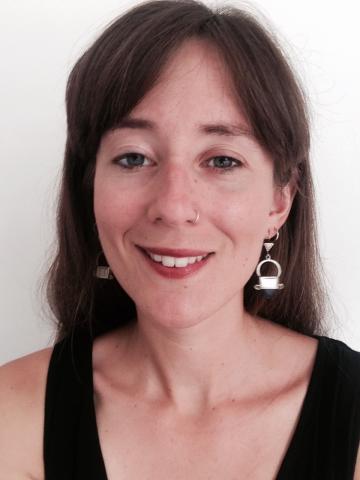
Sophia Benedict
Date joined:
I currently work with women affected by the criminal justice system in my role at the London charity Pecan. Here, I work within an outreach project supporting women resettling after custody, and help coordinate two women’s hubs which offer trauma-informed support for women affected by the criminal justice system. In addition, I work with refugees and asylum seekers in my work at CARAS, a London refugee charity. I hold an MA in Gender and Law from SOAS, University of London.
My research into the experiences of foreign national women, where immigration status and experience of the criminal justice system intersect, arises from an observation that foreign national women encounter a unique set of barriers and challenges in resettlement. After release, unsettled immigration status can significantly impact on women’s access to services and entitlements, with many denied access to public funds and other supports. I am eager to find out more about these experiences, and those of the practitioners who try to engage and support these women. My hope is that by centring the voices of foreign national women and deepening understanding, improvements can be made both to practice and policy.
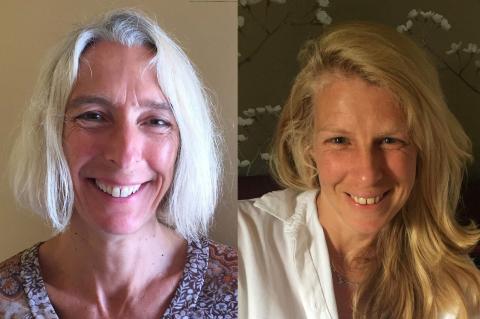
Sandra Barefoot and Ruth Chitty
Date joined:
Sandra Barefoot – As Programme Manager with the Forgiveness Project’s prison programme RESTORE, and a creative artist, I have aspired to reach a place where a specific research lens with female prisoners and their key workers can be placed in order to reveal a deeper understanding of the role that shame takes within the journey of women’s resilience.
With over four years of adapting RESTORE, I and my colleague Ruth have continually met the challenges and difficulties facing the complex needs of women entering the criminal justice system. We have sought, with passion, to highlight the growing need to understand the place of shame and resilience within women’s journeys of imprisonment.
As a creative artist, I have worked for over 25 years in the realms of theatre, dance, visual art, poetry and film. I have used these tools as vital offerings to the youngest of children to the oldest of adults to find their voice, and to be witnessed and heard. I am passionate to incorporate these tools as part of this journey and provide a new and unique way to understand the complexity of shame and resilience, of which often lies within the space of the unspoken and unseen.
Ruth Chitty – I have worked as facilitator of The Forgiveness Project’s RESTORE programme since 2009. My work initially was in the male estate however since 2013 I have concentrated mostly on work with women. My colleague Sandra and I have developed the programme specifically to meet and address the needs of women in both custodial settings and out in the community. This process has deepened my understanding of how best to support women’s thinking, resilience and needs. We are both passionate about our work with women and honing our ability to offer the most useful and supportive interventions for women. The Griffin fellowship is a unique opportunity to look at what Shame Resilience Theory can offer as a lens to view the building of relationships and support.
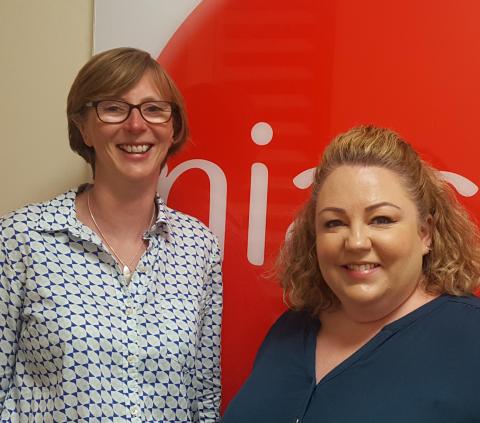
Geraldine McGuigan and Ruth Walker
Date joined:
Geraldine McGuigan - I have worked for NIACRO for 14 years. I am currently Senior Practitioner for NIACRO’s Women’s Project. I am responsible for co-ordinating the delivery of NIACRO services to women affected by the criminal justice system, many of whom have complex needs. Work is delivered in the community, in custody and post release with a focus on equipping women to integrate into their community life, particularly equipping them to access support services within their communities. In my experience the majority of clients I have worked with live in a ‘high risk environment’ which can include alcohol and drug misuse, sexual exploitation, domestic violence, criminal records and coming to the attention of paramilitaries. Part of my role is also to build the capacity of the Women’s and the wider voluntary and community sector to work with women who offend and to engage effectively with criminal justice agencies.
Through this research I hope that by building a profile of women who have offended and experienced domestic violence that we will be able to understand the impact their sentences have had on them and their family. After this I would hope that we can identify ways in which women’s experiences are taken into account at sentencing and make recommendations about alternatives to current sentencing arrangements.
Ruth Walker: Between 2005 and 2016, I delivered (freelance) consultancy services to third and public sector clients, specialising in: social policy research and feasibility projects; programme evaluations; mentoring organisations towards implementing change; and design and delivery of training. In April 2016, I moved into the post of Business Development Manager with NIACRO, a voluntary organisation which has been working for nearly 50 years to reduce crime and its impact on people and communities. I am particularly interested in building NIACRO’s evidencing the impact we are having on service users (including reoffending rates) and their families and understanding how our services make such impact. Within the organisation I am responsible for:
Gathering evidence to measure, understand and communicate our impact; Researching / identifying emerging needs and developing services (and our policy asks) appropriately; Maintaining the resources we hold, with a diverse portfolio of funders, from Government departments to health trust to private foundations. This includes positioning our work appropriately with funders and relevant stakeholders; Securing resources, for example, by: responding to tenders and submitting funding applications; Managing corporate areas of organisational life including, for example quality assurance and staff training.
Together, through our joint Griffisn Fellowship, we are particularly interested in exploring what is taken into account when sentencing women who have experienced domestic violence and looking at alternative sentencing routes.
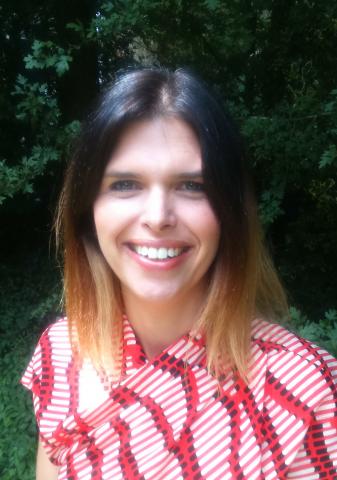
Sarah Smart
Date joined:
I studied Law at Oxford University before qualifying as a solicitor. After University, before the Guildford College of Law, I worked for a year in a residential hostel for homeless teenagers, many of whom were being resettled from Young Offenders Institutions. Since the beginning of 2016, I have worked at HMP Bronzefield in the Mental Health In-Reach Team, through the charity Women in Prison, as a Mental Health Advocate and Through the Gate resettlement worker. I have a particular interest in the mental health implications of imprisonment and am passionate about sentence progression and offender rehabilitation.
Through my work with Women in Prison, I have been struck by the experiences of IPP sentenced women. Those I have worked with have a profound sense of hopelessness and indeterminate sentences carry a high mental health cost. The lack of specific provision and planning available for IPP prisoners, despite the particular nature of their sentence, is troubling to me.
Through my fellowship, I hope to research and discover the barriers to sentence progression – both internal/ psychological and external/systemic – and perhaps encourage the women themselves, as well as influence practise and policy, to enable some of these barriers to be removed.
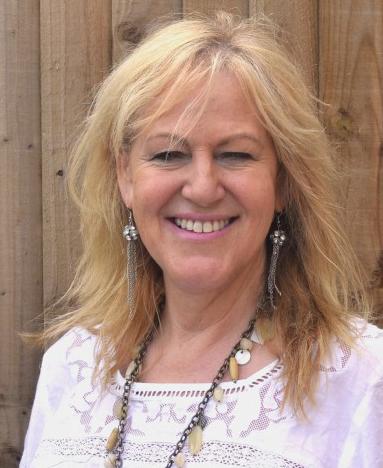
Paula Harriott
Date joined:
I am currently Head of Involvement at Revolving Doors Agency. Here I lead on integrating service user voice and experience into design, delivery and evaluation of services that affect those with serious and complex needs and ensuring that all policy recommendations from RDA are informed by lived experience insight.
I am a Steering Group member of Agenda, the coalition that seeks to support Women and Girls at risk and is a passionate advocate for highlighting the inequalities that affect vulnerable people in the criminal justice system.
My current passion for working with excluded members of the community on a diverse range of issues stems from personal experiences as a service user. My personal experiences and associated research – The experience of being a female prisoner Listener, a qualitative study submitted as part of an Diploma in Integrative Psychotherapy, and The Health Needs of Women Offenders in Resettlement, commissioned by HOB PCT – sharpened my commitment to further raising awareness of the issues faced by offenders. Also my proactive work to both campaign and deliver services that can assist in supporting ex-offenders to progress both personally and strategically past the stigma of imprisonment and multiple exclusion.
Since starting the fellowship I have changed jobs and and I am currently Head of Prisoner Engagement at the Prison Reform Trust.
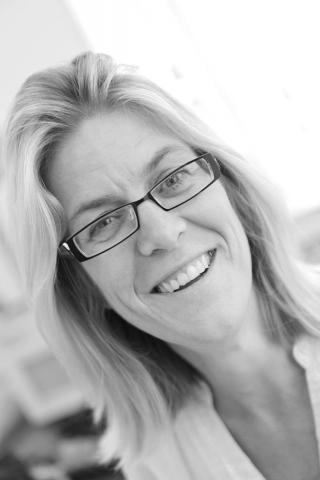
Sarah Burrows
Date joined:
I am a qualified Social Worker and have worked with children and families for over thirty years within a variety of settings including Children’s Homes, Family Centres, Looked-After Social Care Team and Youth Offending Services.
During my time in the Youth Offending Team I developed an understanding of the impact of parental imprisonment on children and young people. This was and still is a relatively new concept with few organisations being solely responsible for developing research and offering services based on analysis of need.
Through this work I developed an understanding of not just the immediate impact on children and young people but an awareness of reduced outcomes.
I have founded an innovative local charity for children of prisoners (Children Heard and Seen) from its point of inception to its growth over the last 2 years.
My passion and main driver is to identify children and young people who have been impacted due to parental imprisonment; to understand the needs of this vulnerable cohort and reduce their risk of entering the criminal justice system themselves - by providing service delivery in the community where they live.
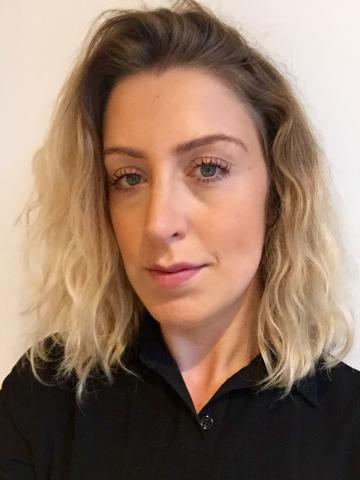
Pippa Goodfellow
Date joined:
I am currently developing and managing the five year Lottery funded Beyond Youth Custody programme (BYC) at Nacro. I have a strong interest in young people in contact with the criminal justice system, which has been a common thread throughout my career. Prior to working at Nacro I worked in crime reduction roles in both local and central government, including the national Tackling Knives Action Programme, a national Home Office programme to reduce teenage knife crime and violent offences. I have also undertaken criminal intelligence analysis for the Metropolitan Police and research at the House of Commons.
The small numbers of girls in custody is largely a result of the success of diverting them away from custody. This small number provides an opportunity for clear oversight and accountability of the agencies involved in supporting each individual girl, with the small numbers in custody seen as a chance to offer a tailored and enhanced approach. However, an unintended consequence has been that girls and young women are held much further away from home, posing challenges for resettlement.
Charlie Taylor’s review of the youth justice system is expected to make radical recommendations for how the approach to youth justice should change in custody and the community, as well as the way that services are commissioned and delivered. This provides a timely and unique opportunity to influence the way that resettlement services are delivered to girls and young women in the future.
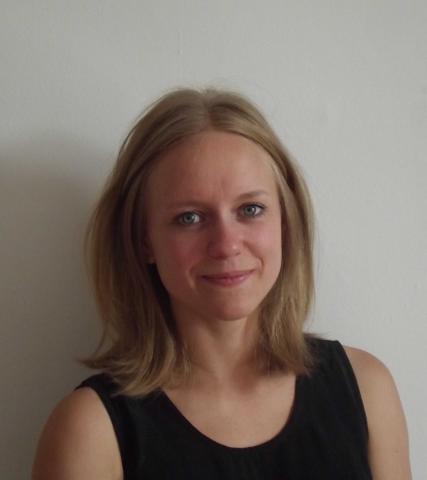
Alice Moore
Date joined:
I currently work at Welsh Women’s Aid, the national charity in Wales working to end domestic abuse and all forms of violence against women. As part of my role I campaign on issues that affect survivors of abuse and issues that prevent survivors from living independent lives free from violence.
Prior to this I completed an MA in Investigative Journalism. As part of this I carried out an extensive piece of work looking at the impact of budget cuts on women in England who were released from prison homeless. Many of these women had experienced abuse and violence. This piece of work involved looking at the homelessness prevention support provided to women upon release from prison by local authorities across England. This Fellowship will now give me the chance to explore the support offered to women in Wales.
I have previously assisted with research around multi-agency approaches to supporting children who have been sexually exploited. I have also supported community groups and grassroots individuals to campaign on issues such as Joint Enterprise and supporting survivors of institutional abuse.
